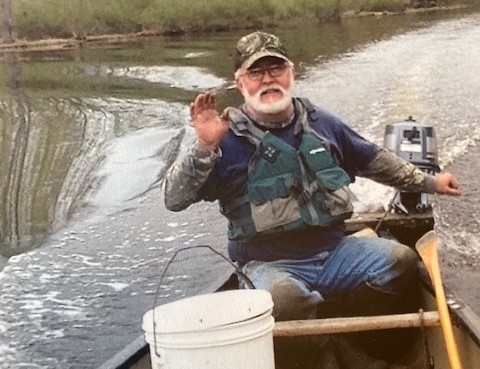
Medway man who made his mark as an Allagash ranger dies of coronavirus
Tom Coon, a dyed-in-the-wool outdoorsman from Medway, reveled in canoeing, fishing, fiddleheading and the quarter century he spent as a ranger on the Allagash Wilderness Waterway.
And when the 63-year-old died May 31 of complications from COVID-19 at Northern Light Eastern Maine Medical Center in Bangor, it was in a hospital room with a view of the Penobscot River down below.
“It was a beautiful view — the trees and the water,” Jolayne DiCentes, his longtime partner, said. “That’s how he went out, very peacefully.”

Photo courtesy of Jolayne DiCentes
ALLAGASH RANGER — Tom Coon, a long-time ranger on the Allagash Wilderness Waterway, died on May 31 of complications from the coronavirus.
In life, though, Coon, who had a heart of gold and “would give anybody a hand,” she said, wasn’t always so serene. He had a nickname he loved — “the Rogue Ranger” — and he came by it honestly.
“Tommy was very outspoken,” DiCentes said. “He would tell it like it is.”
That’s for sure, according to Matt LaRoche, the Allagash Wilderness Waterway Superintendent. Coon, a colorful character who did his job memorably and well, didn’t hold back if he saw something that didn’t seem right.
“He didn’t really conform all the time,” the superintendent said. “If you were the boss, and you did something, he’d call you out. He’d just tell it like it is. He wasn’t looking to move up the chain. He just wanted to be a ranger and he did know his stuff.”
Over the years, he was stationed at various locations along the waterway, including Chamberlain Bridge, Churchill Dam, and Eagle Lake, which he loved the most, LaRoche said. He helped with wintertime rescues of ice fishermen who didn’t come back when they said they would, and became something of a proficient amateur archaeologist. He always knew where he was going, and only had to glance at the map before setting off and getting there.
“In the backcountry, you have to be self-reliant,” LaRoche said, adding that Coon definitely was. “He was a really good woodsman.”
Coon served in the Coast Guard before becoming an Allagash ranger. After his retirement from the Allagash Wilderness Waterway about 10 years ago, he did various jobs, including working as a dump truck driver and working as a driver for Penquis, the social service agency based in Bangor. It was about 10 years ago, too, that he and DiCentes connected. They had always been friends, and their romance just clicked, she said.
“We were kind of like soulmates. He didn’t even have to finish his sentences, and I didn’t have to finish mine,” she said. “We did have fun. It was a good life. The only thing I’m happy about is that the last 10 years were the best time of his life, other than the Allagash.”
Coon loved traveling, and the couple planned to go to Gettysburg, Pennsylvania in June.
But then, at the end of April, they both got sick.
Medway, a town of almost 1,500 people, has become something of a hot spot for the coronavirus. According to the latest information available from the Maine Center for Disease Control, there have been 12 cases in Medway alone, making it the community with the highest number of cases per capita in the state.
Coon and DiCentes didn’t know where they had gotten exposed. She worked in the post office, where she was in daily contact with the public. Coon, who drove for Penquis, was, too.
“It’s kind of literally very hard to track where we had gotten it,” she said.
DiCentes, 64, who tested positive on April 26, was sick for two weeks. Coon, who was very physically active and who could still load a canoe up onto the truck, was sicker. He had been diagnosed with diabetes a few years ago, but “he was as healthy as any other 63-year-old person,” she said.
But the virus took him down.
When he had to go to the hospital, they kept in touch by FaceTime. Even after he was intubated on a ventilator, he still managed to communicate with her. There were up days and down days, but last Saturday, he took a turn for the worse.
“The last call I got from the doctor said, ‘We’ve exhausted everything. There’s nothing more we can do,” she said.
On Sunday, May 31, DiCentes and other family members gathered outside the hospital room, looking through the window. He wasn’t alone, DiCentes said. He was cared for by a nurse who had taken a shine to him, and even though she wasn’t scheduled to work that day, she came in anyway.
The Rogue Ranger, the fisherman, canoe-paddler, moose hunter, Maine Guide, tough talker with a big heart, had reached the end of his journey. That’s when DiCentes saw something that seemed symbolic, and right.
“An eagle flew down,” she said. “And I thought, how fitting.”